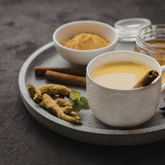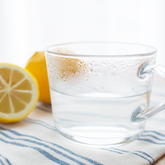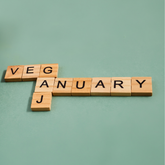As the leaves start to change and the air becomes crisp, it's essential to adapt our eating habits to embrace the flavors and nutrients that fall has to offer. Fall is a transitional season, and our bodies may require some extra care to stay healthy and energized. In this blog post, we will explore some tips and tricks for maintaining healthy eating habits during the autumn months. We'll discuss immunity-boosting foods and shots, the importance of plant-based milk in our diet, the benefits of making our food at home, and the significance of taking vitamins to support our health during this season.
Immunity-Boosting Foods and Shots:

1. Incorporate Seasonal Produce: Fall brings an abundance of immune-boosting fruits and vegetables. Some notable examples include apples, pears, pumpkins, sweet potatoes, and Brussels sprouts. These foods are rich in vitamins, antioxidants, and fiber that can help strengthen your immune system.
2. Herbal Teas and Immune Shots: Alongside your regular meals, consider incorporating herbal teas and immunity shots into your routine. Ginger, turmeric, and echinacea teas can provide natural immune support. You can also create immunity shots by blending ingredients like ginger, lemon, honey, and cayenne pepper. These shots can give your immune system a quick boost. Give this immunity shots a try: Ginger Shot Recipe and Pineapple Carrot Shot Recipe.
Importance of Plant Milk in Your Diet

1. Nutrient-Rich Alternatives: Plant-based milk, such as almond milk, soy milk, and oat milk, are excellent alternatives to dairy milk. They are rich in essential nutrients like calcium, vitamin D, and protein, making them a valuable addition to your fall diet.
2. Dietary Preferences: Plant milk is also suitable for individuals with dietary restrictions, such as vegans and those with lactose intolerance. It's a versatile option that can be used in smoothies, cereals, and coffee, making it an easy substitution in various recipes.
Making Your Food at Home

1. Control Over Ingredients: Preparing your meals at home gives you full control over the ingredients you use. You can opt for fresh, whole foods and avoid the excessive sodium, sugar, and unhealthy fats often found in processed foods.
2. Customization: Cooking at home allows you to customize your meals to suit your preferences and dietary needs. You can experiment with seasonal ingredients, spices, and herbs to create delicious and nutritious dishes.
Taking Vitamins for Extra Support

1. Seasonal Vitamin Deficiencies: Fall often brings reduced exposure to sunlight, which can lead to lower levels of vitamin D. Consider taking a vitamin D supplement to support bone health and immune function.
2. Consult a Healthcare Professional: It's essential to consult with a healthcare professional before starting any new vitamin regimen. They can assess your specific needs and recommend supplements based on your individual health status.
Importance of Exercising

While maintaining a healthy diet is crucial during the fall season, don't forget the importance of regular exercise. Engaging in physical activity helps boost your immune system, improve mood, and keep you energized. Consider outdoor activities like hiking, brisk walking, or even enjoying the fall foliage while cycling. Additionally, indoor workouts or yoga sessions can be excellent options when the weather doesn't permit outdoor activities.
As we transition into fall, adopting healthy eating habits is crucial for our well-being. Incorporating immunity-boosting foods and homemade meals provides vital nutrients. Professional guidance for vitamin supplements can bridge nutritional gaps. To create fresh lemonades, health shots, and plant-based milk with ease, try the Milky Plant machine. In just 3 minutes, at the touch of a button, you can have your beverages ready. It's a convenient way to boost your fall diet and support your health. Let the Milky Plant machine be your ally in maintaining vitality.















